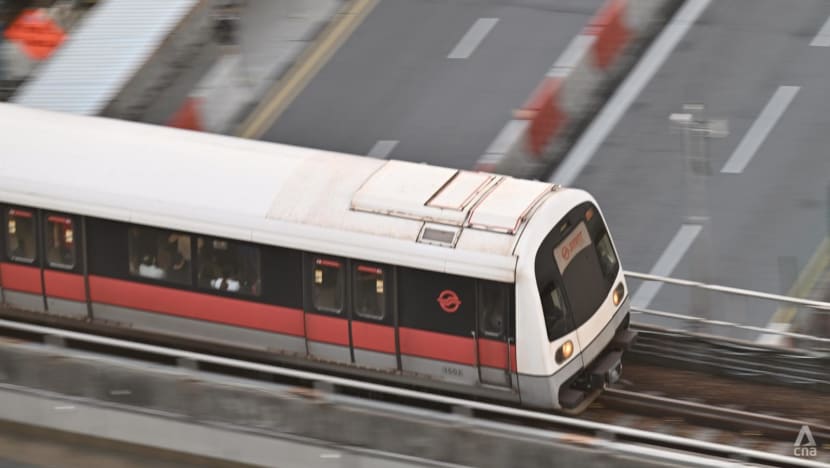Raising rail reliability targets could come at a cost to taxpayers, commuters: Chee Hong Tat
The current rail reliability benchmark of 1 million mean kilometres between failure remains a "relevant and valid" target, said the transport minister.

A train departs from Boon Lay MRT station on Oct 1, 2024. (Photo: CNA/Jeremy Long)

This audio is generated by an AI tool.
SINGAPORE: Raising rail reliability targets could come at a cost to taxpayers and commuters, said Transport Minister Chee Hong Tat.
The current rail reliability target of 1 million mean kilometres between failure (MKBF) remains a "relevant and valid" target, he said in parliament on Monday (Nov 11).
He was responding to a question by Leader of the Opposition Pritam Singh, who said that the target of 1 million MKBF was set about five years ago, and asked if the Ministry of Transport (MOT) is considering raising the threshold.
Mr Chee said that the 1 million figure was chosen because it represents what the best, most reliable rail operators – such as those in Taipei and Guangzhou – have managed to achieve in their systems.
“If we look at it today, I think it's still a relevant and valid target, something that is useful for us to focus on, and that is something which we will continue to work towards,” he said.
The prospect of raising it further has to be carefully assessed, he added.
“Because there is a trade-off between raising MKBF further and what is the cost incurred, which will then ultimately have to be borne by either taxpayers or commuters,” said Mr Chee.
“So, we will study this carefully.”
Rail reliability was being discussed in parliament in the wake of several MRT and LRT system disruptions in the past months.
A major MRT disruption occurred in September when normal SMRT train services along a section of the East-West Line were unavailable for about six days, after a faulty train caused extensive damage to the tracks and other equipment.
Last month, train services along the Bukit Panjang LRT line were disrupted due to a train fault, with services resuming a day later.
Mr Chee said that the overall MKBF for the MRT network has improved from about 1.8 million train-km in end-September, to almost 2 million train-km as at end-October.
“My colleagues and I will continue to pay close attention to keeping the MKBF above the 1 million target, as we know safety and reliability are important for commuters,” he said.
He added that SMRT has formed a workgroup to review its systems and processes, including its maintenance practices.
Representatives from the Land Transport Authority (LTA) and the National Transport Workers’ Union have been invited to join the workgroup. Overseas metro operators in Guangzhou and Taipei will also be engaged for “mutual learning”, said Mr Chee.
BUKIT PANJANG LRT DISRUPTION
MP Yeo Wan Ling (PAP–Pasir Ris-Punggol) also asked for an update on the cause of the LRT train breakdown between Bukit Panjang and Choa Chu Kang LRT stations.
Based on LTA’s initial findings, the incident was caused by a gear failure in one of the wheel assemblies of the train, said Mr Chee. The pair of wheels on the damaged wheel assembly were unable to rotate normally.
As they were unable to rotate, the friction between the LRT train’s rubber tyres and the guideway caused the tyres to deflate.
“This then resulted in a bar below the carriage of the incident train to come into contact with the power rail, which caused damage to the power rail and led to the power trip,” said Mr Chee.
He added that investigations into the incident are still ongoing.
MPs Liang Eng Hwa (PAP-Bukit Panjang) and Edward Chia (PAP–Holland-Bukit Timah) also asked about the progress of upgrading works on Bukit Panjang LRT.
In 2017, former transport minister Khaw Boon Wan said that the LRT system was built as an “afterthought under political pressure”, and was in fact not well-suited to the hilly terrain of Bukit Panjang, contributing to its operational challenges.
Ultimately, it was announced that the Bukit Panjang LRT would be overhauled rather than dismantled. The S$344 million (US$260) renewal project, which started in 2018, will have a new signalling and power rail system, as well as a refreshed fleet, among other upgrades.
In 2022, it was announced that the upgrading of the Bukit Panjang LRT, which was initially slated for completion in 2024, was instead expected to be completed in 2026 due to the impact from the pandemic.
To support the upgrading works, train services on the line will end one hour earlier every Thursday to Sunday, from Nov 14, 2024 to Oct 31, 2025. The services will run normally on public holidays.
Mr Chee said that the upgrading works for the line remain on track for completion in 2026.
“We recognise that the improvement works have been a long journey, but we have to go through this process to fix the legacy problems and deliver better service for our commuters,” he said.
“We thank commuters and residents for their understanding and patience during this period when we are carrying out the renewal programme.”
SMRT has formed a tripartite workgroup to review its systems and processes, including maintenance practices and lifecycle management of assets. It has invited representatives from the Land Transport Authority (LTA) and National Transport Workers’ Union to join this workgroup, as well as engage overseas metro operators in Guangzhou and Taipei for mutual learning. Transport Minister Chee Hong Tat, who gave this update in Parliament on Monday (Nov 11), said the workgroup will identify areas for improvement and to maintain safety and reliability standards. He also informed the House that the overall mean kilometres between failure for the MRT network has improved. Turning to MPs’ questions on the Bukit Panjang Light Rail Transit (LRT) in Parliament on Monday (Nov 11), Mr Chee said renewal works are “progressing well”. These include bringing in new trains and upgrading existing ones. LTA aims to have new and upgraded vehicles enter service by end-2025. LTA also aims to resume dual-loop services for all hours on weekdays in the coming months. Mr Chee said LTA is on track to complete the renewal programme in 2026. “We recognise that the improvement works have been a long journey, but we have to go through this process to fix the legacy problems and deliver better service for our commuters,” he said.
















